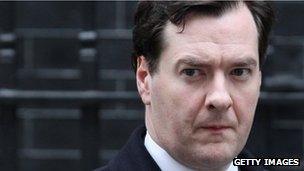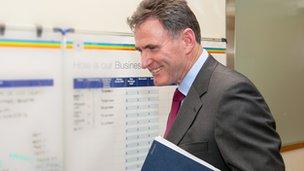RBS: Osborne says decision imminent
- Published

The chancellor said RBS was "a complex bank"
George Osborne expects to make a decision about how to break up the state-controlled Royal Bank of Scotland (RBS) in "the next two or three weeks", he has told the Daily Telegraph.
He said the government - which owns 81% of RBS - was considering hiving off weaker parts into a "bad bank".
The decision was "top of his in-tray", the chancellor told the Telegraph, external.
Meanwhile, chief executive Ross McEwan has told staff not to be distracted by speculation on the bank's future.
RBS was bailed out for £45bn in 2008 at the height of the financial crisis.
"We are looking at the case for a bad bank and, if not a bad bank, what is the alternative strategy that really gets on top of the problems in that bank and goes on being what I want it to be which is a bank supporting the British economy," Mr Osborne said.
He added that he was considering offering shares to the public in Lloyds, the other major bank in which the state holds a substantial stake.
"We are now looking actively at a retail offer for the next tranche of Lloyds shares," he said.
But he said the government was not, "at the moment, close to the stage of being able to sell RBS shares".
He added: "RBS was a much more complex bank.
"To be fair to management past and present, it was a bank that was in a lot more trouble."
He said "the clean-up job" had been "more difficult but we have got to make these decisions now about the future for RBS".
'Taking responsibility'
Investment bank Rothschild has been advising the government on whether the bank's bad loans should be hived off into a separate entity.

Mr McEwan said the debate about a break-up had consumed a lot of management time
But in a memo to staff, Ross McEwan - who took over as RBS chief executive at the start of this month - said a bad bank would only affect a small proportion of RBS's overall business.
Analysts have said that the vast bulk of RBS's assets are likely to be unaffected by the review.
"The truth is, the review and its outcomes are important, but not in the way many people think," Mr McEwan said.
"The future of this company will not be about whether we operate in particular areas or where our problem assets sit. The future of this company is about how good a job we do for our customers, including those who are having difficulty repaying their loans.
"But the debate you read about in the papers - and that has taken up too much time of the management team - has been about what is now a small proportion of our activity."
He said the bank was "taking responsibility for resolving these debates",
"Let's address the legitimate concerns shareholders and other stakeholders have," he added.
"And then let's get on with building a great bank for customers."
Mr McEwan replaced Stephen Hester, who spent four years trying to repair the bank's balance sheet.
- Published18 October 2013
- Published1 October 2013